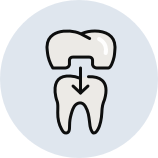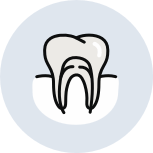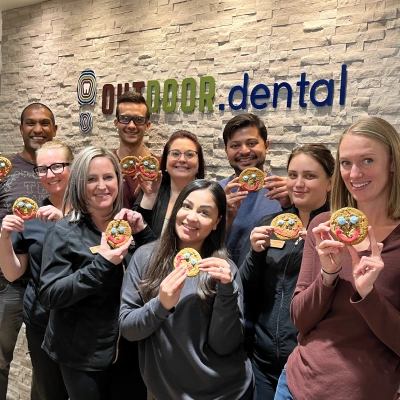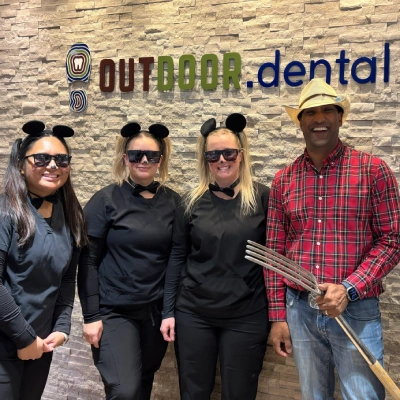Bad breath is a tough subject to broach. It significantly affects our self-confidence and can make us insecure around others.
Chewing gum or popping breath mints are temporary fixes that can’t completely mask bad breath. This is because the underlying culprit may lie in your teeth.
Tooth decay can cause bad breath as it serves as a breeding ground for bacteria. These organisms feast on decaying food particles left behind from inadequate brushing and flossing, causing them to release foul-smelling odours, leading to bad breath.
What is Tooth Decay?
Also known as dental caries, tooth decay develops when bacteria in your mouth produce acids that attack the hard, outer layer of teeth, known as enamel.
Over time, this process can create small openings, or holes, in the enamel, leading to cavities. If left untreated, decay can progress deeper into the tooth’s structure, causing pain, infection, or even tooth loss.
It’s worthwhile to recognize that, while closely related, tooth decay and cavities aren’t exactly the same.
Tooth decay refers to the process of the enamel being attacked and damaged, while cavities are the visible outcome of tooth decay.
How Does Tooth Decay Develop?
Tooth decay doesn’t appear overnight. It’s a gradual process, linked to inconsistent oral hygiene, sugary or acidic foods, and harmful bacteria:
- Plaque formation: Bacteria in your mouth feed on food particles, especially sugars, and form a sticky film on your teeth, called plaque.
- Acid formation: The bacteria in plaque produce acids as a byproduct of digesting sugars. These acids begin eroding your enamel.
- Enamel breakdown: Over time, the acids weaken the enamel, causing early decay, leading to cavity formation if left unaddressed.
- Spread to deeper layers: Through cavity holes, the decay can invade the layer beneath the enamel, known as the dentin, and even the pulp of the tooth, where nerves and blood vessels are located.
What Happens if Tooth Decay is Left Unmanaged?
When left unmanaged, tooth decay worsens and becomes harder to treat.
Beyond cavities, decay weakens tooth enamel, leaving teeth vulnerable to further damage like toothaches and sensitivity to hot and cold foods. It also creates an entry point for bacteria to infect deeper layers of your teeth, potentially leading to gum disease or systemic health concerns.
Severe decay may require extracting the tooth, as the damage can impact your ability to chew and overall self-confidence because of bad breath.
The human body’s ability to repair itself is incredible. However, our enamel isn’t a living tissue. Therefore, once enamel has weakened, it cannot grow back or restore itself, through natural means or dental intervention.
We can take measures to remineralize enamel. But, the greatest line of defense to protect tooth enamel and overall oral health is through consistent oral hygiene, including professional dental cleanings and exams.
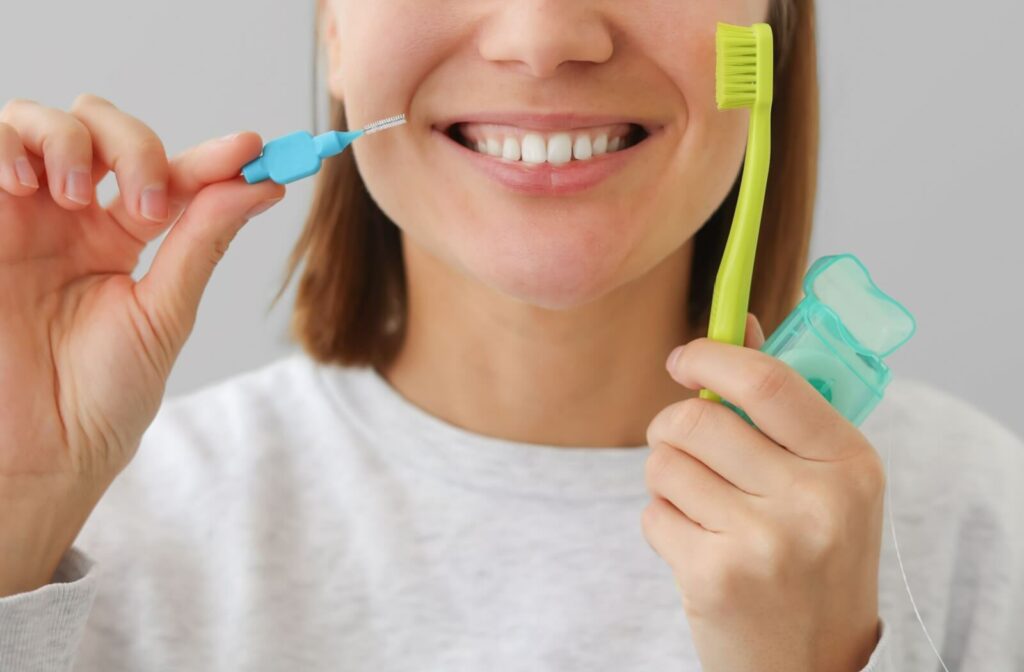
Why Can Tooth Decay Cause Bad Breath?
Tooth decay can cause bad breath, also known as halitosis, because of the accumulation of bacteria in the mouth.
As tooth decay progresses, bacteria thrive and multiply in the affected areas. Bacteria are living organisms. They produce foul-smelling gases as they break down food particles and release sulfur compounds.
The combination of decaying food particles, bacteria activity, and the release of gases and sulfur compounds contributes to the unpleasant smell associated with bad breath.
Oral health concerns like cavities and gum disease can further exacerbate the issue because they provide an environment where bacteria can thrive and produce more foul-smelling odours. An infection in a decaying tooth can also contribute to an even stronger smell.
Can Gum & Breath Mints Help?
Bad breath might initially seem like a minor inconvenience that you can remedy with breath mints or gum. But, chronic bad breath shouldn’t be ignored. The psychological and social impacts of persistent bad breath can affect confidence and strain relationships.
Breath mints and gum may temporarily relieve bad breath by masking the odour, but they don’t target the underlying cause of tooth decay.
Only by addressing the decay and maintaining good oral hygiene practices can the source of the bad breath be effectively treated.
Preventing Tooth Decay & Bad Breath
Fortunately, bad breath and tooth decay can be easily prevented by adopting consistent, healthy oral habits. These practices target the underlying cause of bad breath, most notably, tooth decay.
- Routine brushing: Brushing your teeth for two minutes, at least twice a day, in the morning and before bed, helps remove food particles, plaque, and bacteria from the gumline.
- Flossing: The importance of flossing cannot be understated. Flossing once a day allows you to reach areas the bristles of a tooth cannot effectively reach, effectively removing food and debris between teeth and along the gumline. Traditional dental floss, water floss, floss picks, and interdental brushes are great flossing tools.
- Mouthwash: Mouthwash provides an added layer of protection against bacteria, reducing the risk of bad breath. Mouthwash should complement, not replace brushing and flossing.
- Routine dental exams and cleanings: These appointments are hallmark preventative strategies against oral health concerns. Professional cleanings help remove stubborn plaque and tartar buildup, which can contribute to tooth decay and bad breath. During these cleanings, your dentist will assess your oral health, identify any signs of tooth decay, and provide necessary treatment to prevent further concerns.
- Be mindful of your diet: It’s tough at first, but limit your intake of sugary and acidic foods as they feed decay-causing bacteria. Enjoy them in moderation, but consider snacking on crunchy fruits and veggies, like apples and carrots.
- Stay hydrated: Drinking water helps rinse away food debris and bacteria while keeping your mouth from becoming dry, another contributor to bad breath.
Schedule a Routine Cleaning
Bad breath caused by tooth decay is frustrating, but both concerns are manageable and preventable with the right approach. Adopting healthy oral habits, like visiting your dental team for routine dental cleanings and exams every six-months helps!
Connect with our team at Outdoor Dental to schedule an appointment for your next dental cleaning and exam.




